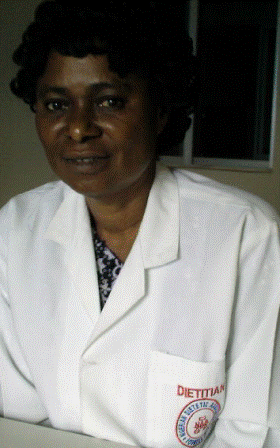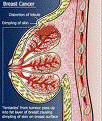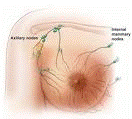YOU ARE   
TABLE OF CONTENTS
DIETARY FORMULATION FOR MANAGEMENT OF CANCER IN NIGERIA
OBESITY - WHAT AND HOW?
DIETARY FORMULATION FOR THE MANAGEMENT OF
CANCER IN NIGERIA
A PAPER I PRESENTED AT THE 38TH ANNUAL SCIENTIFIC CONFERENCE
OF NIGERIAN DIETETIC ASSOCIATION HELD NI KADUNA
KADUNA STATE
ON 20 -24 OCTOBER 2009.
   
   
Cancer, one of the feared and dangerous diseases claims millions of lives world-wide especially in the Third World where screening techniques in determining the possibility of cancer are few and in some non-existent. In Nigeria thousands of lives are lost yearly because of this malignant disease. Lisa Fayed (August 31, 2009) lists different types of cancer and in her rendition Lisa sees cancer as a broad term used to describe hundreds of malignant diseases that can develop in the body. It can develop in just every part of the body, from the eyes to the heart. Each type of cancer is unique, possessing different causes, symptoms, treatment, and prevention techniques. Various cancer diseases like Aids related cancer, anal cancer, bone cancer, brain cancer, breast cancer, Cervical cancer, colon cancer, Oral cancer, Pancreatic cancer, Prostate cancer, rectal cancer, stomach cancer, Vaginal cancer and a host of others.
Breast cancer may be one of the oldest forms, of cancerous tumors in humans. The oldest description of cancer was discovered in Egypt and dates back to approximately 1600 BC. The Edwin Smith Papyrus describes 8 cases of tumors or ulcers of the breast that were treated by cauterization. The writing says about the disease, ‘There is no treatment’ (Lisa Fayed, Ibid, 2009). Breast cancer is a cancer that starts in the breast, usually in the lining of the milk ducts or lobules. There are different types of breast cancer, with different stages (stueon therapy and chemotherapy), and radiation.
Apart from family history of cancer, cancer is a preventable disease. In fact high risk cancer factors include the following: Smoking is the most significant cancer risk factor. It is responsible for not only lung cancer, but many other types of cancer. One of the best ways to prevent cancer is to quit smoking or never start. As soon as you quit, and it’s never too late, your body reaps the benefits of being tobacco free. Animal food based instead of plant based is a cancer risk factor. Also lack of exercise and carcinogen in the workforce are equally cancer risk factors.
Now to the basic – that is the dietary formulations for the management of cancer in Nigeria. This is the main thrust of the paper. Studies have shown that some foods actually contribute to the development of cancer, other foods lessen the risk. The paper looks at the two sides of the coin towards dietary formulation to the management of cancer in Nigeria.
As regards the main thrust of the paper, the World Health Organization has determined that dietary factors account for at least 30 percent of all cancer in western countries and up to 20 percent in developing countries. In fact when cancer researchers started to search for links between diet and cancer, one of the most noticeable findings was that people who avoided meat were less likely to develop the disease. Large studies in England and Germany showed that vegetarians were about 40 percent less likely to develop cancer compared to meat eaters. (Thorogood M, Mann J, et. al. 1994) In United States of America studies carried out on seven-day Adventists, a religious group that is remarkable because, although nearly all members avoid tobacco and alcohol and follow generally healthful lifestyles, about half of the Adventist population is vegetarian, while the other half consume some amount of meat showed significant reduction in cancer risk. (Barnard ND, Nichison A; et. Al 1995). In contrast, Harrard studies showed that daily meat eaters have approximately three times the colon cancer risk, compared to those who rarely eat meat.
The connection between meat consumption and cancer risk has generated a number of hypothesis drawn on meat. In the first place, meat is devoid of fiber and other nutrients that have a protective effect. Secondly, meat also contains animal protein, saturated fat, in some cases, carcinogenic compounds formed during the processing or cooking of meat. In addition, the high fat content of meat and other animal products increases hormone production, thus increasing the risk of hormones – related cancers such as breast and prostate cancer.
Then it follows that there should be decrease of one’s exposure to carcinogens – cancer – causing irritants, pollutants, or substances in one’s diet.
Cancer studies show that countries with a higher intake of fat, especially fat from animal products, such as meat and dairy products, have a higher incidence of breast cancer. In Japan, the traditional diet is much lower in fat, especially animal fat, than the typical western diet, and breast cancer rates are low. So dietary formulations for the management of cancer patients should take note of the following.
The consumption of high-fat foods such as meat, dairy products, fried foods, and even vegetable oils causes a woman’s body to make more estrogens, which encourage cancer cell growth in the breast and other organs that are sensitive to female sex hormones. Also by increasing vegetables, fruits, grains, and beans, and reducing animal derived foods, the amount of estradiol (a principal estrogen) in their blood dropped by 30 percent, compared to a group of girls who did not change their diet (Dorgan J. F, Hunsperger S A, Mcmahon R P, et al, 2003).
Apart from decreasing one’s exposure to carcinogens, it is expected that one should boost his or her immune system so that it can fight organism and eliminate cells that have become precancerous by mutation and also should unsume diet that decreases the formation, or growth of potentially malignant cells. The most influential studies linking cancer and diet showed the following significant correlation:
In the first place a plant based diet instead of an animal based diet lowers the rate of breast, prostate and colon cancer.
Secondly, lung, breast, prostate, and colon cancers account for more than half of all cancer deaths. The interesting news is that these are also the cancers for which dietary changes can lower the risk.
Thirdly, diet can be implicated in at least one-third of all cancers.
Fourthly, increasing of our daily consumption of fruits and vegetables can greatly lower our cancer risk.
Fifthly, diet probably plays more of a role in cancer development than genes. It is well known that the incidence of most cancers is less in Asian culture. The evidence for the diet- cancer link studies have shown that when Asians moved to the United States of America and switched from primarily plant-based diet to an animal based diet, the cancer rates in these immigrants increased to approach those of Americans.
Studies have also shown that countries with high intake of fat, especially fat from animal products, such as meat and diary products, have a higher incidence of breast cancer. But the studies conducted in Japan showed that breast cancer was particularly rare because the diet consisted of plant based food (Lands Klem, Hamazaki T. et. al. 1990). Also as with breast cancer, frequent consumption of meat, particularly red meat, is associated with an increased risk of colon cancer (Singh PN, Frasen GE, 1998). With regard to prostate cancer, researchers have explored a number of possible dietary factors contributing to prostate cancer risk. These include dietary fat, saturated fat, dairy products, and meat, as well as dietary factors that may decrease risk, such as the consumption of carotenoids and other antioxidants, fiber and fruits. Although not as extensively studied as breast, colon, and prostate cancer risk, a number of studies have concluded that meat consumption may play a significant role in kidney and pancreatic cancer risk.
In resume the following guidelines should be strictly adhered to either in the prevention of cancer risk or in the dietary formulation and management of cancer patients.
An unhealthy diet can increase the risk of cancer. Scientists have estimated that unhealthy diets cause 10 to 30%. cancer deaths in developing countries (Thorogood M, Mann J. et.. al. 1994). Thus, because a person’s diet consists of many different foods; nutrients and chemicals that affect their risk of cancer.
Secondly, eating lots of fiber could reduce the risk of bowel cancer. EPIC Scientists recently found that eating foods high in fiber can reduce the risk of bowel cancer (Bingham, S.A; et al; 2003). People who ate the most fiber have 25 – 40% lower risk of bowel cancer compared to people who ate the least. Some studies have found that fiber does not affect bowel cancer.
Thirdly, bowel movements. Fiber could protect against bowel cancer in a few different ways, bacteria in the bowel interact with fiber to produce several chemicals including butyrase. Butyrase changes the condition in the bowel, so that tumors are less likely to develop and reduces the contact time between the bowel and chemicals in the stool.
Fourthly, fruit and vegetables may reduce the risk of many cancers. The EPIC study has found that eating lots of fruit and vegetables could reduce the risk of mouth, esophageal and lung cancers as well as some types of stomach cancer.
Fifthly, fruits and vegetables are good source of vitamins and minerals because they contain a wide range of nutrients. Though researchers are still trying to work our which of these reduce cancer risk, there is no doubt that one needs these nutrients in balanced combinations to reduce the risk of cancer effectively. There is strong evidence that the nutrients in fruits and vegetables do not reduce the risk of cancer when they are taken as supplement. Eating five daily portion of fruit and vegetables can help one maintain a healthy body weight; reduce the risk of bowel, breast, kidney, womb and esophageal cancers.
On the other hand, eating lots of red or processed meat can increase the risk of cancer (bowel). Red meat includes all fresh, minced and frozen beef, pork and lamb. Processed meat includes harien, bacon, salami and sewages. Red and processed meat contains chemicals that could cause bowel cancer. Red and processed meat contains a red pigment called haem. Haem could stimulate the bacteria in our guts to produce chemicals called N-nitro’s compounds. Many of these are known to cause cancer. At the moment there is no scientific evidence that eating white meat, such as chicken, can increase cancer risk.
In addition eating lots of salt could increase the risk of stomach cancer. This applies to salty food, or food that has been processed with salt. Salt could affect the risk of stomach cancer by damaging the lining of the stomach and causing inflammation. Salt could also interact with a stomach bug called Helicopact or pylori that cause both stomach ulcers and stomach cancer.
Conclusion: studies have shown that some foods actually contribute to the development of cancer, while other foods lessen the risk. So the dietary formulation to the management of cancer should look at the guide lines in dietary formulation. This formulation should focus as shown in the paper on foods that lessen cancer risk and can equally help in the management of cancer patients.
Thank you very much for your patience. 
|